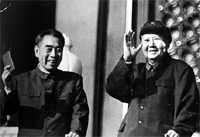
- Zhou-Enlai: The Last Perfect Revolutionary
- PublicAffairs (2007)
I thought I knew all about Zhou Enlai.
Wasn't he Mao Zedong's old crony from the Long March of 1934-5 when Mao and the Red Army escaped from the Chiang Kai-Shek forces, the escape that kept the Red Army intact to fight another day -- that day in 1949 when they tossed out the Chiang forces and declared the People's Republic of China?
Wasn't he the man so close to Mao that he was premier from1949 until the day he died in 1976, working despite his quickly metastasizing cancer until the day he died?
Wasn't he the man who, with the cunning Henry Kissinger, engineered Richard Nixon's amazing trip to Beijing in 1974?
And didn't he, in response to a question asking about the impact of the French revolution, reply "it's too soon to tell"?
The answer to all the questions is "yes...but." The "but" being that far from being a major mover of policy in China, Zhou was a survivor and perhaps the most successful one since Talleyrand survived three French monarchs, a bloody revolution and Napoleon.
Scary dance partner
I hadn't intended to buy Zhou-Enlai, The Last Perfect Revolutionary for two reasons. I thought it would be the story of someone who was simply Mao's marionette and I noted the book had been translated from Mandarin into English and thus would be stilted prose at best. I was wrong on both counts for Zhou. While he was indeed a Mao sycophant, for that reason, he is an important window through which one can examine the tumultuous years he was premier. And the translation is superb.
In analyzing Zhou's career it must be remembered that Mao was a murderous mad man in a class with Hitler and Stalin so that nobody, least of all Zhou, was safe. This was emphatically demonstrated by the so-called Cultural Revolution, started by Mao in 1967, which resulted in young hooligans roaming the country humiliating and often killing people -- including many people in high places -- for no better reason than perceived lack of enthusiasm for Mao's government. It was a horrible time and when you read the insights into Mao's personality it becomes little short of a miracle that Zhou survived. Deng Xiaoping, later the force behind bringing capitalism to this communist state, lived but was exiled into oblivion while the onetime court favourite Lin Biao died in a plane "accident." Indeed none were safe.
I came away from the book with three conclusions:
Mao was mad but for a bloody dictator highly skilled at the art of combining political smarts with brutality.
Zhou survived because he was the only one of the inner circle who could read Mao's mind and know when to rat on a comrade or make a humiliating "confession of his own sins" and thus save his own skin.
While Mao intensely disliked Zhou he seemed to understand that without Zhou's obedience and craft he wouldn't be able to command the heights. Indeed, this book is as much an insight into what Mao was made of as it was about the talented lackey he had in Zhou.
Beware the Red Queen
Of considerable interest are the meanderings of that loosest of cannons, Mao's wife Jhian Qing, who, as one of the "gang of four," was purged after Mao's death. It was no mean feat to handle the boss but the boss's wife, whose mad crusades, taken quite independently of her husband, reminds one of the Red Queen of Alice in Wonderland. While Jhian sorely tested the already beleagured Zhou, he somehow managed to deal with her and her cronies.
The puzzle that is China of the last century has many pieces -- this book is a very valuable piece indeed.




